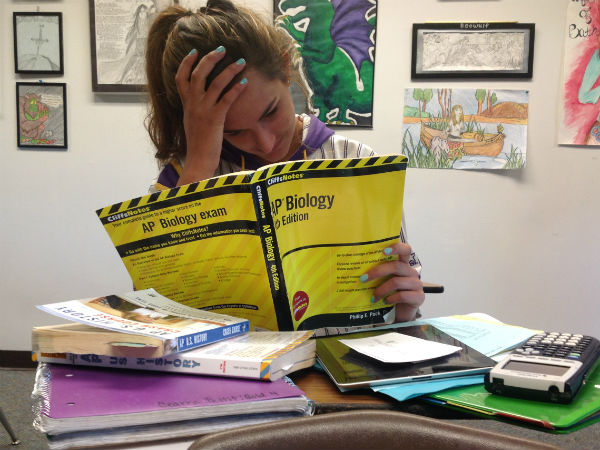Homework over Break: Student View One

April 28, 2014
The bane of many a high school student’s existence lies in the simple two syllable word that is often connoted with school: homework. And while the practice of homework is surely far from enjoyable, the purpose is actually quite valuable – to reinforce and solidify concepts learned during school hours, and to prepare students for upcoming material by giving them a head start.
However, homework during break? Here at Cathedral Catholic, there is an eleven-day Easter adjournment so as to give the student population a rest and chance to enjoy the true meaning of the season. The question lies, do the same principles regarding the value of homework stand true?
It appears as though a large percentage of the student population doesn’t think so. Especially on the days leading up to the reopening of school, social media outlets were flooded by angry students venting about their undesired assignments. “R u serious?! My last few days ruined by pointless homework…#ugh” tweeted a Cathedral junior. Dozens of heated Facebook statuses and Tweets followed in the same manner.
But when determining whether or not homework over break is important, I decided to take a look at the Cathedral Catholic ESLRs – Expected Schoolwide Learning Results. Cathedral strives to create students who “Demonstrate independence and self-direction as learners.” An eleven-day break is the perfect opportunity for students to do just this: start learning in the world around them, opening themselves up to new experiences, not just two-dimensional problems on paper assigned as part of a graduation requirement.
CCHS learners “apply academic knowledge as productive citizens in a 21st century global society.” Especially in the diversity and acceleration of today’s ever-changing world, there are countless opportunities for students to learn in ways not otherwise offered in the classroom. Attending cultural festivals, visiting new museums, reading for fun, day-tripping to new places, these are the kind of experiences that a break should foster, not the same old routine homework of the eight-to-two school day.
Additionally, the ESLRs say that Cathedral strives to create responsible individuals who “develop healthy relationships and promote a healthy lifestyle.” This is where the true purpose of a break comes into play. It is easy for a typical high school student to become burned out, especially with the intensity that lies in today’s society. Tough academics, competitive sports, numerous extra-curricular commitments, pressure from family and friends… all of these lead to anxiety and stress which are obviously far from part of a healthy lifestyle. A break offers the chance to recharge, relax and prepare for the upcoming return to normalcy; therefore, homework would only detract from its true purpose.
So is homework over break a positive or negative practice? It’s up to you to decide. Naturally, the vigor of a class must be taken into account – that is to say, it would be far more logical to assign homework for an AP Calculus class to retain fundamental concepts than for a class with less of a challenging nature.
“I get that homework over break can help retain skills, but overall I just think it is kind of unnecessary,” said CCHS junior Alexa Samaniego. “Teachers should be able to cover a lot within the 95-minute class time. Plus, break is meant to give students exactly what the name suggests – a break, a chance to recharge. That’s hard to do if you’re still stressing out over homework and projects.”





















































